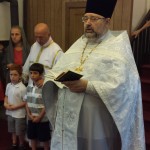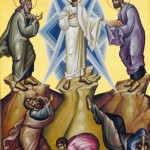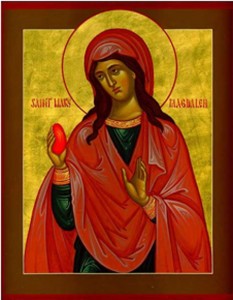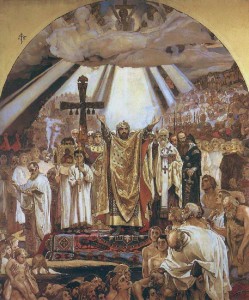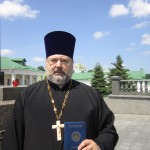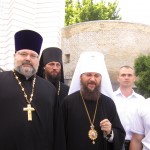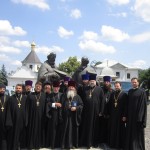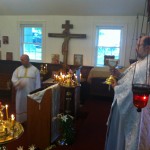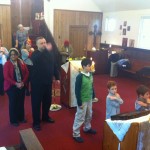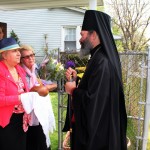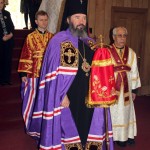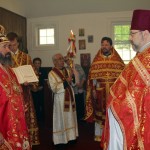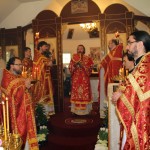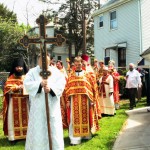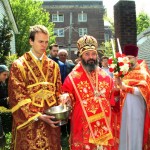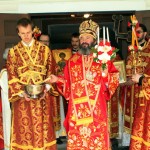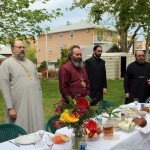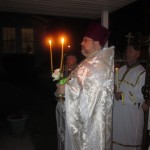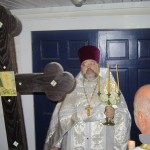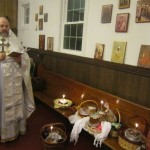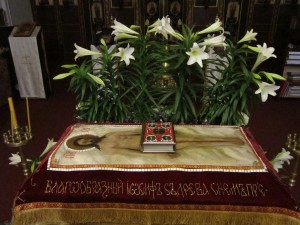On September 1, on the 10th Sunday after Pentecost we had a usual celebration in our church. Our Rector, Archpriest Igor Tarasov served the Divine Liturgy.
After the Scripture readings Fr. Igor preached a sermon interpreting the Epistle lesson. He pointed out that in the assigned reading St. Paul is telling the Christians of Corinth that they differ from the Apostles by their way of life. He exclaims, “We are fools for Christ’s sake, but you are wise in Christ!” (1 Cor. 4, 10). If we tried to understand these words literally, we could think that St. Paul gives an option to be fools in Christ or to be wise in Christ. However, it is easy to understand that he is sarcastic.
Fr. Igor continued saying, “Corinthian Christians who were relatively new community founded by St. Paul himself, became relaxed and attempted to combine Christian faith with some luxury of secular life. They tried to be Christians and preserve some worldly attitude. This is why St. Paul uses irony and sarcasm. He hopes that it could be a good medicine to cure spiritual weaknesses of his followers in Corinth. He says, “We are fools for Christ’s sake, but you are wise in Christ! We are weak, and you are strong! You are distinguished, but we are dishonored!” (1 Cor. 4, 10). And he goes on telling that the Apostles, including himself, hunger and thirst, are poorly clothed, are beaten and homeless. They labor, working with their own hands. They are persecuted and reviled (1 Cor. 4, 11-12). At the same time Christians of Corinth are not suffering these misfortunes, but think that they are still good followers of Christ. This why the Apostle does not condemn them directly but teaches that they are wrong. You cannot be a good Christian and not suffer for Christ. You cannot serve two masters, as the Lord Himself said (Mt. 6, 24).”
“Nowadays many Christians and even Christian communities believe that they can adopt their Christianity to modern life, to the demands of the secular world. They think that they can combine Christian faith with the worldly existence. They abbreviate church services, make their temples comfortable, allow the people to indulge themselves. Some of them now agree to bless same-sex marriages or pray for the pet animals. In one of such ‘churches’ a couple of years ago a minister gave Communion to a dog. They probably think that they are ‘wise in Christ’ for they wish to be ‘popular’, ‘close to the people’, to attract today’s people. Thus they may think that they are strong and distinguished. And we, Orthodox Christians who do not wish to do such things, are viewed as ‘fools’, as ‘weak’. Well, the same way the Apostles were viewed.”
“But even among us, Orthodox, sometimes there is a spirit of the early Corinthian church. We have a temptation to combine our Christianity with the secular values. This is why we have different problems in our parishes. Something resembling the situation of St. Paul and other Apostles may be seen in our Church life in this country. Many our priests are not supported by their parishes, but have to labor, work with their own hands or other talents. On their time off they take care of the parishes, come to serve the Liturgy. But some parishioners have their requirements they set for the clergy. Similar situation as described today by St. Paul.”
“However, St. Paul uses these words of irony, as he himself says, “not to shame” but “to warn” his disciples in Corinth. The Corinthian Christians were his spiritual children. As in the family, so in the Church, children need parental guidance. Same in our Orthodox communities, in our parishes, people need guidance from the clergy. Since St. Paul founded the community in Corinth, he is the father of the Corinthian Christians. As such he finishes today’s Epistle lesson with the words, “Therefore I urge you, imitate me” (1 Cor. 4, 16). This would mean that Corinthians should imitate the Apostles, become fools in Christ, become persecuted and endure sufferings for Christ’s sake. They should abandon their way of life and follow the example of St. Paul and other Apostles.
Fr. Igor finished his homily saying, “Therefore, dear brothers and sisters, let us imitate St. Paul and other holy Apostles who imitated our Lord Jesus Christ. Let us not fool ourselves that we may be good Christians and serve the world, combine our faith with secular values. Let us remember who our fathers are and be their followers.”
After the Liturgy the Rector celebrated a short memorial service (Litia) for the repose of our long-time parishioner Vladimir (Walter) Soho and Fr. Igor’s grandmother Catherine (Kateryna) Tarasova.
Following our services we enjoyed coffee and refreshments kindly prepared by our ladies.

